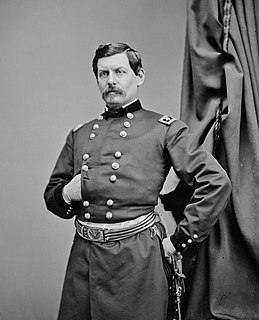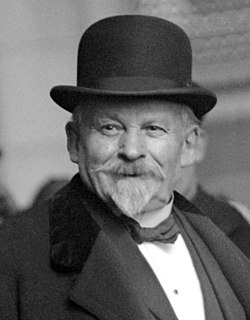A Quote by George B. McClellan
The Union, which can alone insure internal peace, and external security to each State, Must and Shall be Preserved, cost what it may in time, treasure, and blood.
Related Quotes
A truly free society must not include a peace which oppresses us. We must learn on our own terms what peace and freedom mean together. There can be no peace if there is social injustice and suppression of human rights, because external and internal peace are inseparable. Peace is not just the absence of mass destruction, but a positive internal and external condition in which people are free so that they can grow to their full potential.
Without union our independence and liberty would never have been achieved; without union they can never be maintained. Divided into twenty-four, or even a smaller number, of separate communities, we shall see our internal trade burdened with numberless restraints and exactions; communications between distant points and sections obstructed or cut off; our sons made soldiers to deluge with blood the fields they now till in peace...The loss of liberty, of all good government, of peace, plenty, and happiness, must inevitably follow a dissolution of the Union.
Our time has been distinguished, more than by anything else, by a mastery, a control, of the external world, and by an almost total forgetfulness of the internal world. If one estimates human evolution from the point of view of knowledge of the external world, then we are in many respects progressing. If our estimate is from the point of view of the internal world, and of oneness of internal and external, then the judgment must be very different.
The First Amendment, however, does not say that in every and all respects there shall be a separation of Church and State. Rathe, it studiously defines the manner, the specific ways, in which there shall be no concert or union or dependency one on the other. That is the common sense of the matter. Otherwise the state and religion would be aliens to each other.
The price of peace is righteousness. Men and nations may loudly proclaim, 'Peace, peace,' but there shall be no peace until individuals nurture in their souls those principles of personal purity, integrity, and character which foster the development of peace. Peace cannot be imposed. It must come from the lives and hearts of men. There is no other way.
The powers delegated by the proposed Constitution to the federal government are few and defined. Those which are to remain in the State governments are numerous and indefinite. The former will be exercised principally on external objects, as war, peace, negotiation and foreign commerce. ... The powers reserved to the several States will extend to all the objects which in the ordinary course of affairs, concern the lives and liberties, and properties of the people, and the internal order, improvement and prosperity of the State.
I am for lasting peace... United, I believe, we can win the battle for peace. But it must be a different peace, one with full recognition of the rights of the Jews in their one and only land: peace with security for generations and peace with a united Jerusalem as the eternal, undivided capital of the Jewish people in the state of Israel forever.





































